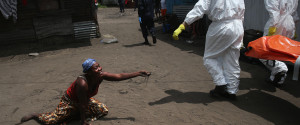 MONROVIA, Liberia — Racing along split and rough streets here, Gordon Kamara yelled into his cellphone over the screeching sirens of his emergency vehicle. The telephone had been ringing constant since 5 a.m.
MONROVIA, Liberia — Racing along split and rough streets here, Gordon Kamara yelled into his cellphone over the screeching sirens of his emergency vehicle. The telephone had been ringing constant since 5 a.m. The calls have all been the same lately: from companions, companions of companions, broadened family, finish outsiders. Every one of them have friends and family debilitated with Ebola and beseech him to come rapidly. Seven days a week, Mr. Kamara and his group compass Monrovia, Liberia's capital, in a gave, old American rescue vehicle — with California permit plates still connected.
"It never stops," said Mr. Kamara, getting an alternate call the minute he hangs up.
Keep perusing the principle story
Related Coverage
A Liberian warrior and an United States Marine took cover as a V-22 Osprey buzzed overhead in Tubmanburg, north of Monrovia.
In the midst of Ebola Crisis, Liberian Army Sees Its Chance at Rebranding Oct. 11, 2014
Dr. Margaret Chan, the chief general of the World Health Organization, amid an United Nations session a month ago on the Ebola emergency in West Africa.
W.h.o. Boss Calls Ebola Outbreak an 'Emergency for International Peace' Oct. 13, 2014
The 15 or somewhere in the vicinity emergency vehicle groups blasting around the city have had numerous days of hard decisions like this. Many new Ebola cases are accounted for every week in Monrovia, with a lot of people all the more never represented. Also throughout the span of the pestilence, just a little rate of them have ever constructed it to a healing facility.
"We see it move through the groups; initial one, then a lot of people," Mr. Kamara said. "The guide is continuously painted red with the infection."
To go up against the spread of Ebola, some group gatherings have ventures in, inspired by unselfishness, urgency and, now and again, political advantage.
In a few neighborhoods, groups of volunteers fan out to track exploited people and teach family units on fighting off the infection, however their pockets are shallow to the point that they frequently don't have enough supplies, in the same way as chlorine, to obstruct the pandemic's development.
Mr. Kamara does not work for the legislature. He doesn't even have a dispatcher to let him know where to go, or which patients to get. Rather, his group is financed by a resistance part of Parliament, Saah H. Joseph, who transported in two utilized American ambulances to Monrovia .

Post a Comment